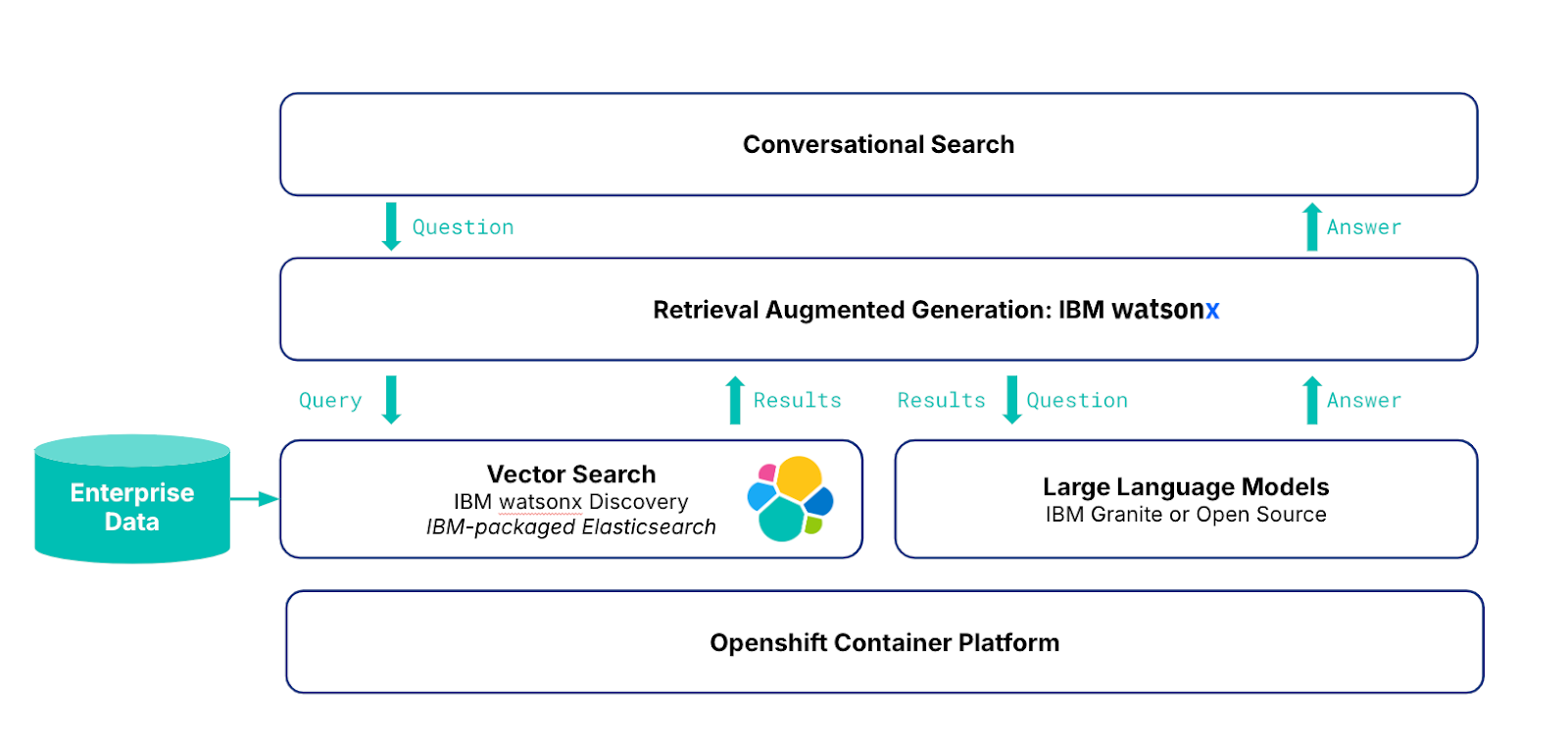IBM partners with Elasticsearch to deliver Conversational Search with watsonx Assistant
.jpg)
To meet customer needs for scale, speed, and precision, IBM partners with Elasticsearch to deliver retrieval augmented generation (RAG) capabilities that can be seamlessly integrated into the IBM watsonx Assistant’s new Conversational Search feature. Customers using IBM watsonx Assistant and watsonx Orchestrate can now build conversational AI assistants grounded on their company data with comprehensive search capabilities with RAG.
Integrating watsonx Discovery — an IBM pre-packaged solution powered by Elasticsearch — with Conversational Search gives businesses the tools to combine proprietary documentation with large language models (LLMs) like IBM Granite. This combination brings users chat experiences enriched by business context.

Why Elasticsearch for IBM watsonx Assistants?
IBM was looking for a powerful search vector database solution to store text, image, and video embeddings for its clients. With the Elasticsearch vector database, not only are all those data formats supported, but there is also a catalog of integrations to bring data from various enterprise data sources, including third-party. Retrieval across disparate data types can also leverage secure and native hybrid search for the most relevant combination of text, vectors, and geospatial data results with filtering, aggregations, and document-level security.
Developers can now implement vector search and semantic search, including k-nearest neighbors (kNN) and approximate nearest neighbor (ANN) search, with flexible multi-cloud model management provided for popular natural language processing (NLP) models and Elastic open inference API. Elasticsearch also includes ELSER, an out-of-the-box sparse encoder model for semantic search, and access to reranking models to improve search results. These capabilities can be used seamlessly with IBM foundation models (like Slate and Granite), available in IBM watsonx.ai.
Elasticsearch is the world’s most downloaded vector database, and our team is constantly investing in its capabilities to take its performance and scale further. More recently, optimizations and innovations like adding scalar quantization and other performance enhancements resulted in up to 8x to 32x efficiency gains for developers building AI-enabled apps.
What is IBM watsonx Discovery?
IBM watsonx Discovery delivers a flexible platform for conversational search. As a critical component of IBM watsonx Assistants, it integrates with the Elasticsearch vector database to deliver semantic, federated, and vector search over business-specific content across different channels and touchpoints.
Customers can use IBM watsonx Assistant’s new Conversational Search feature and IBM watsonx Discovery today.
Getting started
Visit IBM watsonx Discovery to learn more about this new capability using Elasticsearch. You can follow these steps for setup and integration with IBM watsonx Assistants.
Visit Elastic Search Labs for articles and sample notebooks on vector search, RAG, and more.
The release and timing of any features or functionality described in this post remain at Elastic's sole discretion. Any features or functionality not currently available may not be delivered on time or at all.
In this blog post, we may have used or referred to third party generative AI tools, which are owned and operated by their respective owners. Elastic does not have any control over the third party tools and we have no responsibility or liability for their content, operation or use, nor for any loss or damage that may arise from your use of such tools. Please exercise caution when using AI tools with personal, sensitive or confidential information. Any data you submit may be used for AI training or other purposes. There is no guarantee that information you provide will be kept secure or confidential. You should familiarize yourself with the privacy practices and terms of use of any generative AI tools prior to use.
Elastic, Elasticsearch, ESRE, Elasticsearch Relevance Engine and associated marks are trademarks, logos or registered trademarks of Elasticsearch N.V. in the United States and other countries. All other company and product names are trademarks, logos or registered trademarks of their respective owners.


